Physical Address
304 North Cardinal St.
Dorchester Center, MA 02124
Physical Address
304 North Cardinal St.
Dorchester Center, MA 02124

Outdoor adventures in Georgia demand crucial knowledge about weather extremes, wildlife encounters, and terrain challenges that could make or break your camping experience.
You’re planning a Georgia camping trip, but the Peach State’s diverse terrain and unpredictable weather patterns can catch even experienced campers off guard. From the cooler Appalachian foothills to the humid coastal plains, Georgia’s camping challenges shift dramatically based on location and season. Whether you’re dealing with sudden thunderstorms, steering through black bear territory, or managing the state’s notorious humidity, there’s essential information that’ll determine whether your outdoor adventure becomes a memorable experience or a survival situation.
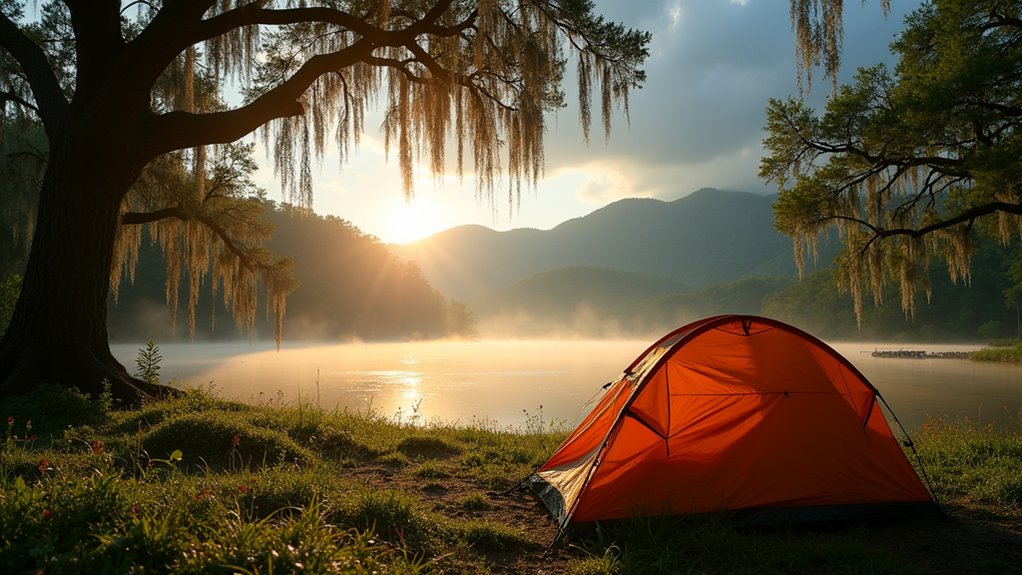
When you’re planning a camping trip in Georgia, you’ll quickly discover that the state’s weather can shift dramatically depending on your location and the season. The northern mountains experience cooler temperatures year-round, with potential snow in winter, while the southern coastal plains stay warmer and more humid.
Summer brings intense heat and humidity statewide, with afternoon thunderstorms that can roll in quickly. You’ll face temperatures reaching the 90s with high humidity that makes it feel even hotter. During these sweltering months, staying properly hydrated becomes critical for safe and enjoyable outdoor adventures.
Georgia’s summer heat and humidity create sweltering conditions that make camping feel like an endurance test against nature’s intensity.
Spring and fall offer the most comfortable camping conditions, though you should still prepare for sudden weather changes.
Winter camping requires careful planning, especially in higher elevations where temperatures can drop below freezing. Always check local forecasts and pack layers to adapt to Georgia’s unpredictable weather patterns.
Georgia’s 63 state parks operate under a centralized reservation system that you’ll need to master before your camping adventure begins. You can book campsites up to 11 months in advance through the Georgia State Parks website or by calling their reservation center. Popular parks like Vogel and Unicoi fill up quickly, especially during peak seasons, so book early.
Each park enforces specific regulations you must follow. Check-in typically occurs after 4 PM, and quiet hours run from 10 PM to 6 AM. You’re limited to eight people per campsite, and pets must stay leashed.
Most parks require a two-night minimum stay on weekends. Cancellation policies vary, but you’ll usually forfeit fees if you cancel within 48 hours of arrival. When packing for your Georgia camping trip, don’t forget to bring adequate water supplies and plan your hydration strategy to prevent dehydration in the state’s humid climate.
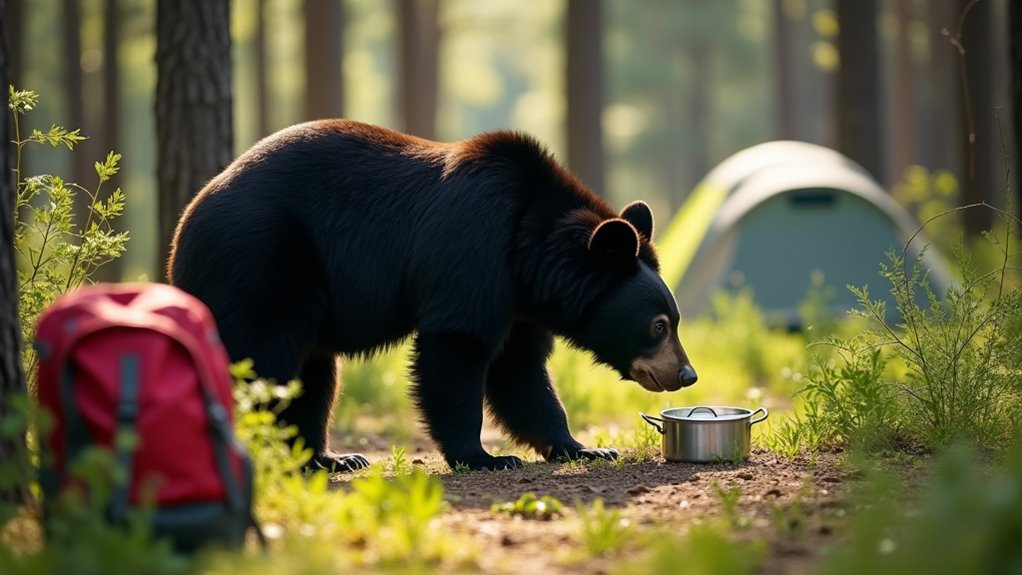
Although black bear encounters remain relatively rare in Georgia’s wilderness areas, you’ll want to prepare for the possibility since the state’s bear population has grown markedly over the past decade.
Store all food, toiletries, and scented items in bear-proof containers or hang them at least 12 feet high and 4 feet from tree trunks.
If you spot a bear, don’t run—back away slowly while making yourself appear larger by raising your arms. Speak in a calm, firm voice and avoid direct eye contact.
For aggressive encounters, fight back with rocks, sticks, or bear spray.
Beyond bears, maintain distance from deer, wild boar, and venomous snakes like copperheads and timber rattlers that inhabit Georgia’s forests.
Always ensure you have reliable water purification methods during your camping trip, as staying hydrated with clean water is crucial for maintaining energy and alertness when navigating wildlife encounters.
Since Georgia’s subtropical climate creates oppressive humidity levels that can reach 80-90% during summer months, you’ll need strategic cooling methods to stay comfortable and avoid heat-related illness.
Set up camp in shaded areas and use reflective tarps above your tent to deflect heat. Pack moisture-wicking clothing and change shirts frequently as cotton retains sweat. Freeze water bottles before your trip—they’ll melt into cold drinks while cooling your body when pressed against pulse points like wrists and neck.
Plan activities during cooler morning and evening hours, avoiding midday heat. Use battery-powered fans inside your tent and consider camping near water sources for natural cooling.
Stay hydrated constantly, drinking water before you feel thirsty. Electrolyte supplements prevent dangerous sodium depletion from excessive sweating. Always inform someone of your planned route and expected return time to ensure trip safety in case of heat-related emergencies.
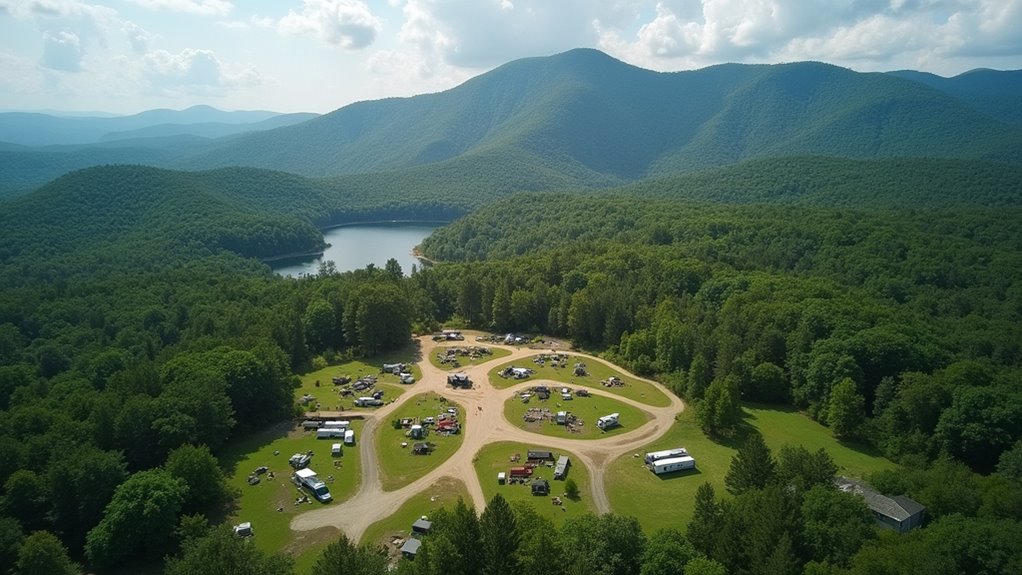
When you’re selecting a campground in Georgia, your skill level should directly influence whether you choose developed facilities with amenities or venture into backcountry wilderness areas. Beginners should start with state park campgrounds like Vogel or Fort Mountain, which offer restrooms, showers, and fire rings. These spots provide safety nets while you’re learning essential skills.
Intermediate campers can explore semi-primitive sites at places like Chattahoochee National Forest, where you’ll find basic facilities but fewer amenities.
Advanced outdoors enthusiasts should consider backcountry camping in areas like the Cohutta Wilderness or along the Appalachian Trail, where you’ll need self-sufficiency skills.
Match your comfort zone with appropriate infrastructure. Don’t jump into primitive camping without mastering basics like weather preparation, food storage, and navigation first. Regardless of which type of campground you choose, always practice responsible camping principles to protect Georgia’s natural environments for future generations.
While Georgia’s warm climate and dense forests create ideal camping conditions, they also provide perfect habitats for ticks that carry serious diseases like Rocky Mountain spotted fever and Lyme disease.
You’ll want to wear long pants and long-sleeved shirts, tucking your pants into socks when hiking through tall grass or wooded areas. Apply EPA-approved insect repellent containing DEET, picaridin, or permethrin to exposed skin and clothing.
Perform thorough tick checks every few hours, paying special attention to your scalp, behind ears, underarms, and groin areas.
If you find an attached tick, remove it immediately using fine-tipped tweezers, grasping close to the skin and pulling straight up. Clean the bite area with rubbing alcohol and monitor for developing rashes or flu-like symptoms over the following weeks.
Consider treating your camping gear and clothing with permethrin-based products before your trip, as this provides additional protection and helps create a safer camping environment.
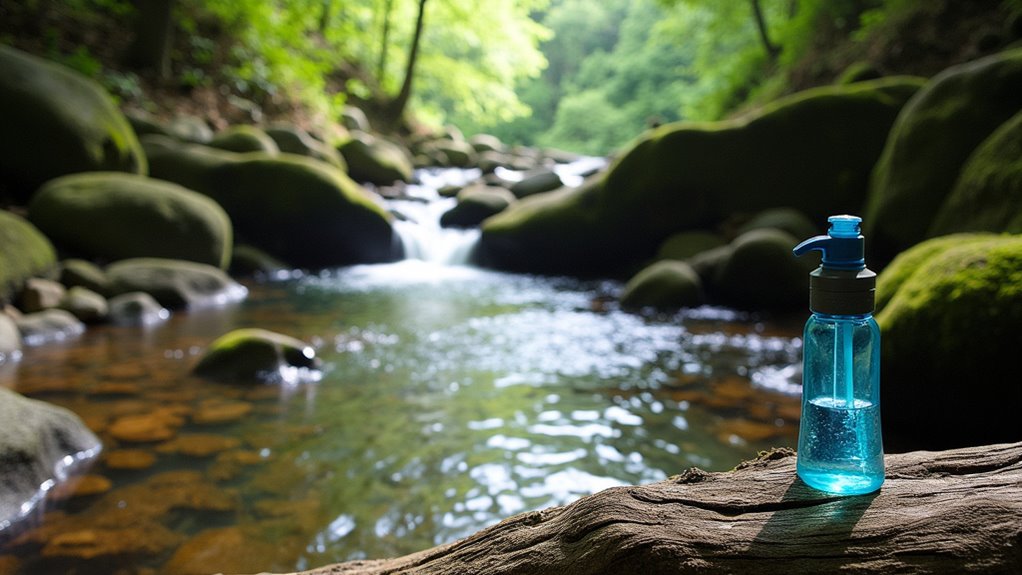
Although Georgia’s streams, rivers, and lakes appear crystal clear and inviting, you can’t assume they’re safe to drink without proper treatment. Even pristine mountain streams can harbor harmful bacteria, parasites, and viruses that’ll make you seriously ill.
Always bring multiple purification methods. Boiling water for three minutes kills most pathogens effectively. Water purification tablets work well but require 30-minute wait times. Portable UV sterilizers are quick and efficient for clear water sources.
Pack a quality water filter rated for bacteria and protozoa removal. Gravity-fed filters work great at camp, while pump filters offer flexibility on trails. Consider bringing backup purification tablets even with filters. A reliable camping water filter serves as your primary defense against waterborne illnesses during extended wilderness adventures.
Test your equipment before departing. Know your daily water needs – typically one gallon per person for drinking, cooking, and basic hygiene.
How quickly can a small campfire spiral into a devastating wildfire in Georgia’s dry conditions? You’d be surprised how fast flames can spread through pine needles and dry underbrush. That’s why you must check Georgia’s burn ban status before lighting any fire.
The Georgia Forestry Commission issues burn bans when conditions become dangerous. You’ll find current restrictions on their website or by calling local ranger stations.
Even without active bans, follow these rules: clear a 10-foot radius around your fire pit, keep water and dirt nearby, never leave fires unattended, and completely extinguish flames before sleeping or leaving camp. Remember that safe campfire practices are essential for preventing accidents and protecting Georgia’s natural areas.
Many state parks restrict fires to designated rings only. Some areas prohibit ground fires entirely, allowing only elevated camp stoves. Always verify specific regulations for your camping location.
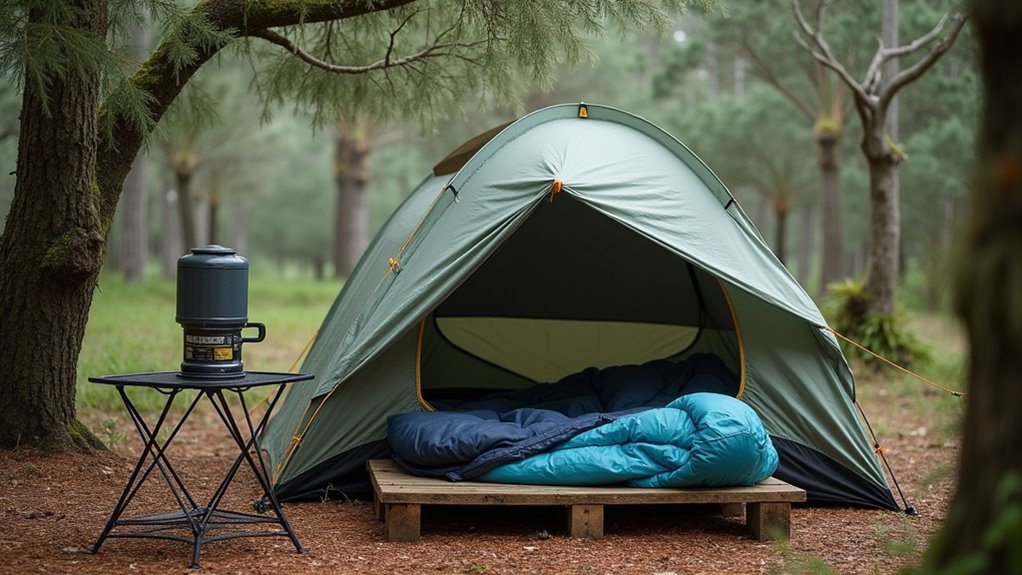
Since Georgia’s climate swings from sweltering summers to surprisingly cold winters, you’ll need to modify your standard camping gear for ideal comfort and safety.
Georgia’s unpredictable weather demands gear adjustments—from sweltering humidity to surprising cold snaps that catch unprepared campers off guard.
Pack moisture-wicking base layers and breathable fabrics for summer’s oppressive humidity.
Your sleeping bag should handle temperatures 10-15 degrees below the forecast since Georgia’s nights drop considerably.
Choose a tent with excellent ventilation to prevent condensation buildup during humid conditions.
Bring a reliable tarp for sudden afternoon thunderstorms that’ll soak everything in minutes.
Waterproof your boots and pack extra socks since Georgia’s wet conditions create perpetually damp feet.
Include a quality headlamp with backup batteries for extended darkness during winter months.
Finally, pack insect repellent year-round—Georgia’s bugs don’t hibernate.
Implementing these smart strategies will ensure your Georgia camping experience remains comfortable regardless of the state’s unpredictable weather patterns.
When you’re exploring Georgia’s diverse landscapes, you’ll encounter six venomous snake species that demand your respect and recognition. Copperheads, cottonmouths, coral snakes, and three rattlesnake varieties call Georgia home. Learning their distinctive markings and behaviors keeps you safe on the trails.
Prevention beats confrontation every time:
You’ll recognize venomous species by their heat-sensing pits, triangular heads, and elliptical pupils. If you spot one, back away slowly without sudden movements. Most bites happen when people try to kill or capture snakes unnecessarily. Many new campers make the mistake of underestimating wildlife encounters, but proper preparation and awareness are your best defense against common camping mistakes.
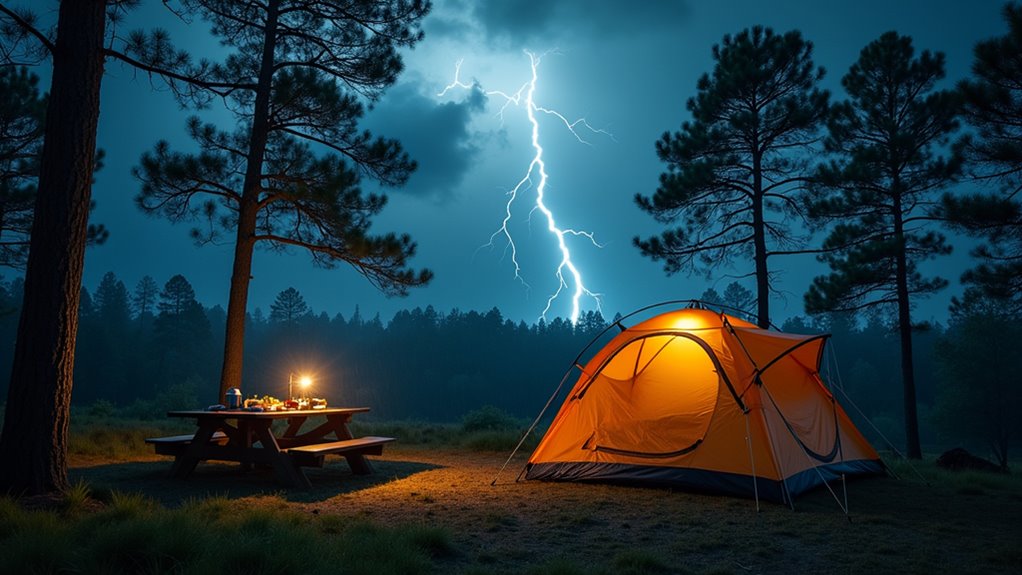
Georgia’s unpredictable weather patterns can turn your peaceful camping trip into a dangerous situation within minutes. You’ll need to monitor weather forecasts continuously and download a reliable weather app before heading out. Pack a NOAA weather radio for real-time alerts when cell service fails.
During thunderstorms, avoid tall trees, metal objects, and open areas. Seek shelter in your vehicle, not your tent. If you can’t reach shelter, crouch low in a valley or depression, staying on the balls of your feet.
For severe weather warnings, know your evacuation routes and nearest sturdy buildings. Keep emergency supplies accessible: flashlights, extra batteries, first aid kit, and emergency food. Don’t wait for conditions to worsen—act immediately when weather deteriorates.
Creating a detailed camping checklist before your trip ensures you have all necessary emergency equipment and safety gear readily available when severe weather strikes.
While staying safe during storms protects you and your fellow campers, protecting Georgia’s delicate natural environments requires equal attention to your impact on the land itself. Georgia’s diverse ecosystems—from Appalachian forests to coastal marshlands—face constant pressure from increased camping activity.
Follow these essential Leave No Trace practices:
Proper food storage and campsite cleanliness also help minimize dangerous encounters with wild animals that may be drawn to human food sources.
You’ll preserve these precious landscapes for future generations while maintaining access privileges.
You’re now equipped with the knowledge to tackle Georgia’s diverse camping challenges like a seasoned outdoor navigator reading a well-marked trail. Remember, you’ll face everything from mountain coolness to humid plains, so you’ve got to stay flexible with your plans. Don’t forget to book early, respect the wildlife, and always have backup strategies for weather changes. With proper preparation and these essential tips, you’ll create unforgettable memories while protecting Georgia’s beautiful landscapes.